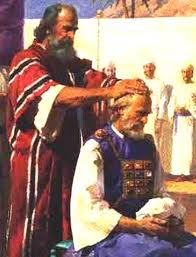Of Priests and Rabbis: A Karaite Kohen Answers

A Response to Shanti
An interesting question Shanti and one that I am asked quite often as you might expect. The resentments that I harbour at first might appear to be the result of the usurpation of roles and functions of those of the Kohenim by the Rabbis but that is actually incorrect. Having been taught in the Orthodox Yeshiva (you’ll have to read my other hubs to see how that happened) I recognized that those that were instructing me had moving targets. Their interpretations at any one time were often self-serving and as I did study Talmud as well, I realized it had always been that way from the time they gained control of the community. The usurpation is actually taking over the authority of God, Himself, claiming to understand, interpret, and dictate exactly what the Lord intended. Because as soon as they were given the authority to mete out punishments based on the abrogation, refusal, or defiance to their own interpretations then they were making the statement that they could speak for God and their words were law. Not even those of us born as Kohenim and that functioned in the Temple could make that claim, and that was the primary focus of the Pharisees denigration of the priestly families, proclaiming us to be lax, unobservant, to “wishy-washy” to use a modern day expression. In reality we were realistic, compassionate, understanding and compromising. As the Kohenim guided the Jewish nation through the occupations, dominations and subjugations by the other nations, it was with the knowledge that Torahitic could be preserved by appreciating that adherence without defilement was possible through understanding intent and context, something sorely lacking from the Pharisaic movement.
The book of Leviticus outlines the duties, responsibilities, requirements, and obligations for the entire family of any Levite (high priests and lay priests) who serves in the Temple. And it states that they will be judges and teachers, but that these judgements must be made within boundaries of fair applications of the laws of the Torah. But by contrast the Rabbis regard their Oral Laws (as they have espoused and recorded in the Mishnah and Talmuds (as you know there exists more than one Talmud) as being superiorly binding on all Jews, and that this authority to make it so was mandated by God. In Rabbinical Judaism, the Oral Law forms the basis of the Jewish religion, morality, and Jewish life. As Karaite Jews, we rely on the use of sound reasoning, rational application, and through the use of well-researched linguistic tools to determine the intended meaning of the Tanakh. So it is a direct application of those laws in the books that God has gifted to us, while the Rabbis fall back on their oral laws, created, dictated and codified in the Talmud by themselves, to provide the Jewish community with an accurate understanding of the Hebrew Scriptures as they deem fit. The old saying of “Who truly knows the ways of God,” is no less accurate now as it was back then. It meant as Kohenim, we had to provide reasonable interpretations but always take into consideration that God never intended his laws to be an unbearable burden upon the people. That as a compassionate and merciful God, he would not have been shouting “Off with their Heads” like the red queen is so commonly overheard in Alice in Wonderland, yet this is exactly how many menial, minor and perhaps not even intentional actions would be judged by the Talmud of the Rabbis. Let me put this into a real perspective so that you can visualize exactly what I’m saying. If a man was sitting in the synagogue on the Sabbath and was wearing a tallis, then we have a situation where there are fringes on the four corners of this prayer shawl. If he should snag one of these corners and tears out the fringes then he is considered to have broken a commandment which demands that any four cornered garment has fringes upon it. Now in his panic, that man attempts to repair the damaged corner, retying the fringes so that he fulfils the commandment of having four. But in so doing, he has violated one of the Rabbinical 39 tractates of the Sabbath on weaving threads (see http://hubpages.com/hub/39-Lashes-Karaite-Sabbath) and having performed ‘Work’ as reasoned by the rabbis he is to be put to death. Though current laws, thankfully in most countries, would not permit these rabbis to pass a death-sentence on such a trivial violation, the fact is that when the rabbis were in their heyday of the middle ages of the Muslim Empires, they did have the authority to exact such an unfair and brutal punishment. By placing heavy burdens upon the general populace they were able to use fear, threats of punitive actions, to mould the people as they deemed fit and that in itself was a violation of the intent of the Torah.
The Kohenim, did not receive the tithes merely as a gift for which they had no obligations. No, they undertook on behalf of the people of Israel the performance of the most restrictive and demanding of the commandments in order to provide a greater latitude to the general populace. They led by example but did not demand that the people had to undertake every single legal requirement exactly as they did. This was the literal intercession of the priests, so often referred to yet so poorly understood by the Pharisees and their rabbinic offspring. And even then, the Kohenim made no claims that they necessarily performed these actions exactly as God demanded because they were merely men and therefore they could act only to the best of their knowledge and understanding. God would be the final judge, not men, a situation not unlike the Kohen Gadol entering into the Holy of Holies each Day of Atonement. If he had failed to fulfil his obligations correctly, then he was not expected to emerge from the sacred room alive. Understanding, comprehension, rational interpretation always had to be tempered with love and mercy, a major fault as the Pharisees and Rabbis proclaimed against us as they displaced the Kohenim from their hereditary position.
Do we have examples of the Rabbis considering the Kohenim or Sadducees too merciful in their interpretations? Of course we do. Let’s look at one that exists now and has been a source of conflict and anti-Semitism. This one has been a problem for close to eight hundred years since it was commanded by those whom are considered the pinnacle of the Rabbanite. In particular it is in regards to the return of the exiles to Israel and in this case both Rambam and Rashi are in agreement. Sadly, when two Rabbis of such magnitude make a statement, then amongst the Rabbanites it is taken as Gospel (The use of that word was intended because that is the writings of men). The verse in Bamidbar says “And you shall dispossess the inhabitants of the land, and live in it.” Rashi says “and you shall drive them out, and then you will dwell in the land.” The only difference between these two sages is that Rashi says the commandment is to drive the people out – settling the land is a promise, not a commandment whereas Ramban disagrees and says there are two mitzvot in the pasuk, one to drive them out and another to dwell in the land. Either way it is interpreted as a very harsh punishment to destroy the lives of other people simply because they do not share our faith and to do so without compensation, compassion, or consideration of the fact that we are doing to them exactly what we have accused and condemned others for doing to us over the centuries. As Kohenim, we would look at the fact that there was no prohibition on having strangers within our midst. In fact, the Torah commands us to welcome the stranger and remember that once we too were strangers in a strange land. So once again, the more reasonable, moderate interpretations of the Kohenim, which allowed us to survive while under Persian, Seleukid, and Roman domination were entirely overridden by the more radical Pharasaic (Rabbinic) interpretations which forced us to undertake not only one but two suicidal wars against the most powerful Empire of its time and as a result completely destroy our homeland, destroy our Temple, exile us to the four corners of the world and sentence hundreds of thousands of us into slavery and death. And yet a thousand years after that folly, you have two of their greatest, honoured and respected sages stating that they would do it all over again. And a thousand years after that, we have Orthodox Jews saying that their sages were 100% correct in this interpretation and repeating the mistakes of the past. Their teachings are prejudicial, entrenching a superiority complex into the people that was never dictated by God. A light unto the world, that was our role; our purpose; and God’s intent for us. A suffering servant, that was how we were to behave, with the knowledge of redemption and God’s love. And by example the people of the world would come and join us in our faith. Now, I hope you can clearly see the difference between the teachings of the Kohenim and those of the Rabbis. Nothing has changed and time will judge which of us is correct.







